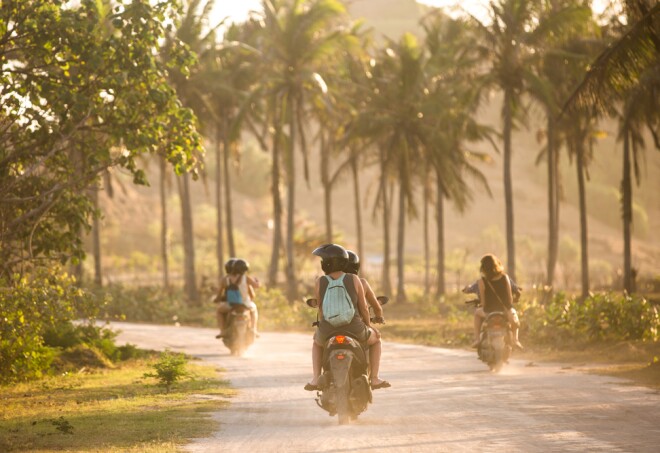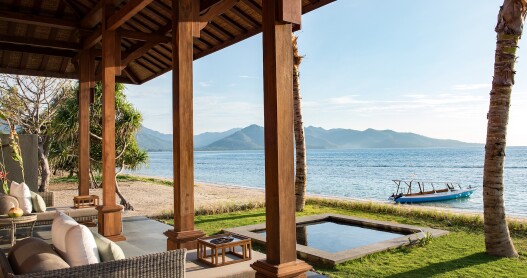Overview
When’s the best time to go to Bali?
Bali has only two seasons, wet and dry. From September to April it rains—not monsoonlike as in India, but rainstorms are common most afternoons. May through August is drier and sometimes called “kite season” because of the cool breezes. Mid-December to mid-January and June to September are popular with tourists, which means higher prices and sometimes heavy traffic.
How to get around Bali
Ngurah Rai International Airport is the only airport in Bali. It’s located in Tuban, next to the tourist hub of Kuta, and about 15 to 20 minutes from the resorts of Nusa Dua and Jimbaran. The town of Ubud is about an hour away depending on traffic and time of day, but a new toll road opened in 2013, and it shaves off about 20 minutes, if your driver uses it.
Bali has become an island packed full of motorbikes and cars. Only recently has the government introduced public buses, but the system isn’t of much use to tourists, as the buses only go up and down the main bypass. The best ways to get around are to rent a motorbike or hire a driver with a car. A motorbike should cost no more than $4 a day, and a car with driver will cost about $45 for a whole day. If you do choose to ride a motorbike, wear a helmet and be aware that many of Bali’s drivers don’t take road laws all that seriously.
Can’t miss things to do in Bali
The rice terraces of Jatihluwih are often missed by tourists but offer one of the most breathtaking sights in Bali. Take a walk along the paths and stop at one of the tiny warungs selling drinks. Breathe in the wonderful, cool, fresh air. This is Bali at its most natural.
Food and drink to try in Bali
With a primarily Hindu population, Bali’s food centers around pork. Ceremonial dishes like lawar (a spicy chopped pork, vegetable, and coconut mixture) and babi guling (spit-roasted suckling pig) are the most traditional of Bali’s dishes, but many elements of Indonesian cuisine are also used. Food cooked in Balinese homes can be oily and spicy, but restaurants and hotels often serve more westernized versions that are easier on the belly. For vegetarians, delicious tofu, tempeh, and vegetable dishes are available everywhere. Street food like satay, martabak (an omelette with vegetables or meat inside), and boiled or grilled corn are cheap and sold everywhere. Arak and tuak are the local tipples, made by tapping palm trees, but quality and taste vary greatly.
Culture in Bali
Offerings are laid daily in the morning and evening to appease the gods and spirits that the Balinese believe exist in every part of nature. In addition to the numerous village temples, each house has its own temple. Dance, music, painting, and carving are important arts, practiced the same way they have been for centuries. Some say the island’s culture is being watered down by tourism, but in every part of Balinese life, community—meaning temples and ceremonial duties—continue to come first before all else.
Bali is an island constantly buzzing with ceremonies and festivals. Not a day goes by when you don’t see people in their temple clothes carrying offerings somewhere. The most important festival is Galungan, held every 210 days. On this day the gods descend to check that everyone is behaving and then ascend 10 days later on Kuningan. Temples are adorned and piled high with offerings, and the streets are lined with penjor (tall bamboo poles decorated outside each house). Balinese New Year, or Nyepi, which usually falls in March, is also a very important day.
Practical Information
- Visa requirements vary depending on your citizenship but Americans traveling to Bali just need a passport--unless they’re staying longer than 30 days.
- The Balinese people usually speak both Balinese and Indonesian.
- The currency is the Indonesian Rupiah.
- As for plugging in your hair dryer or chargers, the voltage is 230V which works on appliances that range from 220V to 240V, but you’ll need a two-pin plug adapter.
Local travel tips for Bali
Bargaining is expected when you shop in Bali, but sometimes visitors think this means getting the price down as low as you possibly can. Yes, sellers see a foreign face and start ridiculously high, but do agree to a price that is mutually beneficial. Mentally set the price you wouldn’t mind paying, then walk away if you don’t get that price.












